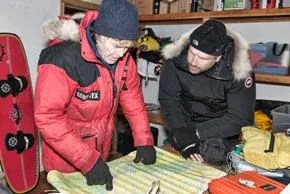“This is the suit I wore for the Trans-Antarctica expedition”, Will Steger says nonchalantly as he flops an insulated onesie covered with sponsor patches on the crude table, his breath visible in the unheated gear shed. Snow covers the skylights and it’s dark inside. Steger is comfortable in the dark and cold; this is the man who led the first dogsled expedition across the Antarctic continent.
He continues rummaging through a closet of expedition jackets with a decidedly 1980s color palette. “We were the first to use reflective patches on our jackets for visibility in whiteouts”, he says without a hint of boastfulness. Of course! And now they’re on every rain jacket you see on city sidewalks, along with the vertical zipper chest pocket, another Steger innovation.

This stuff belongs in a museum. In fact, Steger’s gear shed is a museum of sorts, a place where expeditions were outfitted and groundbreaking gear was designed; it is a tangible timeline of some of the greatest feats of polar exploration in history. On the wall hangs a crude pair of pants made from fur-covered seal skin. Leaning in the corner is a quiver of fat skis. Steger grabs a pair of yellow Epokes from the pile and looks at them like he would an old friend. “This pair has been through everything. I’ve even used them to break up dog fights.”
In addition to his 1990 crossing of the Antarctic continent (the long way) as head of an international team of men from six countries, Steger’s curriculum vitae reads like a history book of polar exploration. In 1986, his unsupported dogsled journey to the North Pole was history’s first verified of its kind. His 1988 south-to-north unsupported traversal of Greenland, which was done as training for the Southern Continent attempt, was also the first such journey. And in 1995, he became the first to complete a dogsled crossing of the Arctic Ocean, from Russia to Canada, a trip that will probably never again be possible given the rapidly melting sea ice on top of the world. This fact is something that profoundly troubles Steger.
Minnesota’s Polar Legacy

